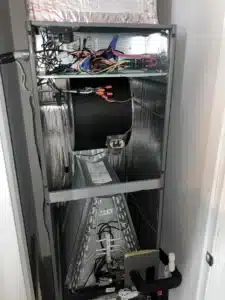In Florida, high humidity is a constant challenge, impacting both indoor air quality and the performance of your HVAC system. Understanding how humidity influences these factors is crucial for maintaining a comfortable and healthy indoor environment. Here’s a closer look at the effects of humidity and how to manage it effectively.
The Impact of Humidity on Indoor Air Quality
- Mold and Mildew Growth: High humidity levels provide the perfect environment for mold and mildew to thrive. These fungi can spread rapidly on surfaces such as walls, ceilings, and HVAC components, releasing spores into the air. Exposure to mold spores can trigger allergies, asthma, and other respiratory issues, compromising indoor air quality.
- Dust Mites: Dust mites flourish in humid environments, particularly in bedding, upholstery, and carpets. These microscopic pests produce allergens that can exacerbate conditions like asthma and allergic rhinitis. Controlling indoor humidity can help reduce dust mite populations and improve air quality.
- Volatile Organic Compounds (VOCs): Humidity can influence the concentration of volatile organic compounds (VOCs) in indoor air. VOCs, emitted from products like paints, cleaning supplies, and building materials, can cause headaches, dizziness, and other health problems. Lowering humidity levels can help reduce the off-gassing of VOCs, improving overall air quality.
- Bacteria and Viruses: While some bacteria and viruses thrive in low humidity, others prefer high humidity. Maintaining an optimal indoor humidity level (between 40-60%) can help minimize the survival rate of various pathogens, creating a healthier indoor environment.
How Humidity Affects Your HVAC System
- Increased Load on the System: High humidity levels make your HVAC system work harder to cool your home. The system not only has to lower the temperature but also remove excess moisture from the air. This increased load can lead to higher energy consumption and strain on the system, potentially shortening its lifespan.
- Reduced Efficiency: Excess humidity can reduce the efficiency of your HVAC system. When the air is too moist, the system must run longer to achieve the desired comfort level. This prolonged operation can result in higher utility bills and increased wear and tear on the system components.
- Potential for Water Damage: High humidity can lead to condensation within your HVAC system, particularly on the coils and ductwork. If not properly managed, this condensation can cause water damage, corrosion, and mold growth within the system, leading to costly repairs and reduced air quality.
- Thermostat Accuracy: Humidity can affect the accuracy of your thermostat readings. High humidity levels can make the air feel warmer than it actually is, causing the thermostat to misread the indoor temperature and overwork the HVAC system. This can result in an uncomfortable indoor environment and inefficient energy use.
Managing Humidity for Better Indoor Air Quality and HVAC Performance
- Use a Dehumidifier: Integrating a dehumidifier with your HVAC system can effectively manage indoor humidity levels. Dehumidifiers remove excess moisture from the air, helping to maintain optimal humidity levels and improve both air quality and system efficiency.
- Regular Maintenance: Regular HVAC maintenance is crucial for managing humidity. Ensure that coils, condensate drains, and filters are clean and functioning properly. Regular inspections can identify and address issues like leaks or blockages that can contribute to excess humidity.
- Proper Ventilation: Good ventilation is essential for controlling indoor humidity. Use exhaust fans in areas prone to moisture, such as bathrooms and kitchens, and ensure that your HVAC system’s ventilation is adequate to promote air circulation and prevent humidity buildup.
- Seal Leaks: Check for and seal any leaks in your home’s envelope, including windows, doors, and ductwork. Proper sealing prevents humid outdoor air from entering and helps maintain a controlled indoor environment.
- Monitor Humidity Levels: Use a hygrometer to monitor indoor humidity levels regularly. Aim to keep humidity between 40-60% for optimal comfort and air quality. If levels consistently fall outside this range, consider adjusting your HVAC settings or adding a dehumidifier.
Conclusion
Managing humidity is essential for maintaining good indoor air quality and ensuring the efficient performance of your HVAC system in Florida. By understanding the effects of humidity and implementing strategies to control it, you can create a healthier, more comfortable living environment. For expert advice and comprehensive HVAC services, contact our team today. We’re here to help you achieve optimal indoor air quality and system performance year-round.





